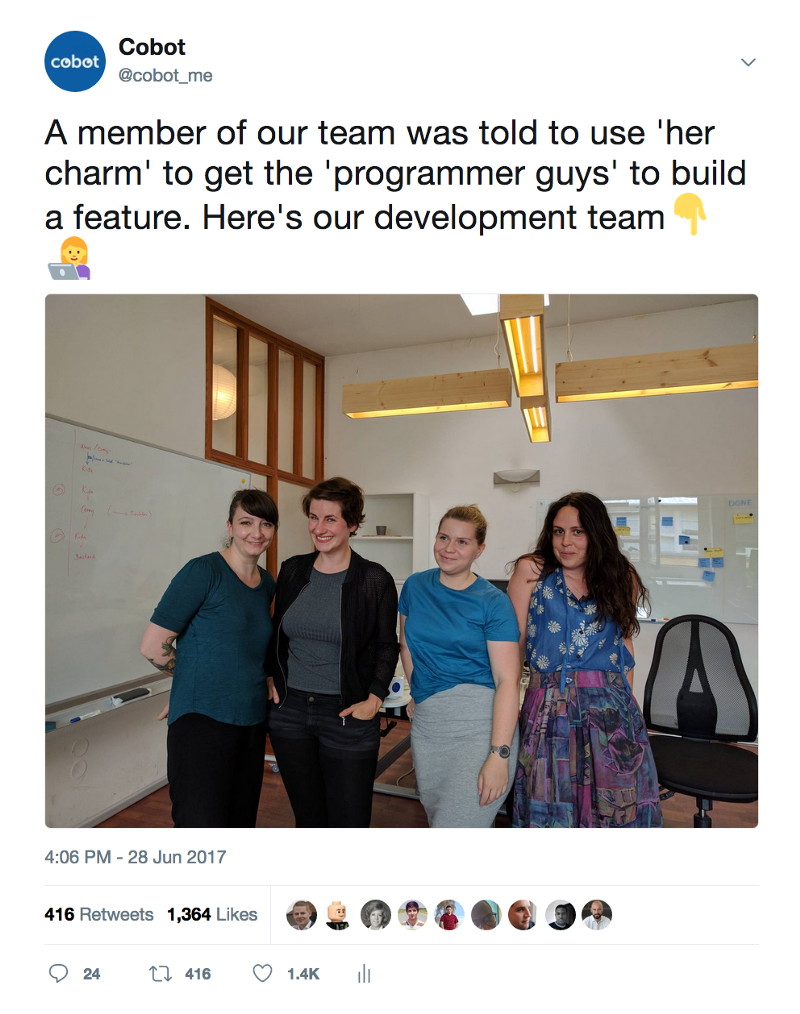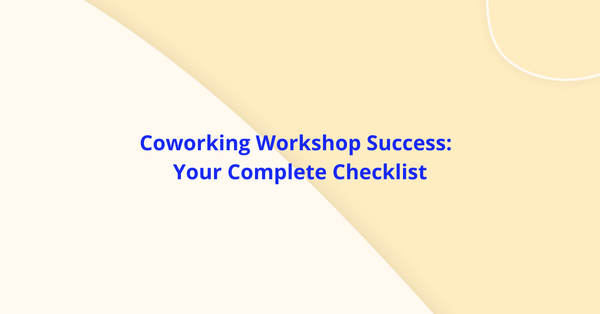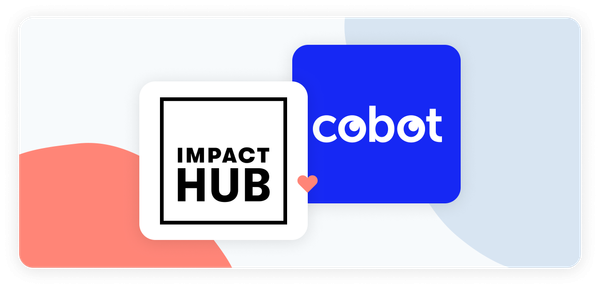Two weeks ago, we received a comment from a customer that made everyone drop their work for a moment. It was something very close to our hearts so decided to tweet about it. Unexpectedly, it went… kind of viral. The issue is out there and the noise hasn’t died down. Several questions were raised and the thread got bigger and bigger. We didn’t expect such an explosive reaction, though. However, we were happily surprised by the many supportive responses we received from customers and friends from all over the world. We felt there was a need to engage further with the conversation. And for a topic this complex, Twitter might not be the best forum, so here we are.
This is what happened: It all started as a polite support conversation with a customer who made a couple of feature suggestions. At some point he implied to the person from our team he was talking to — a woman — that she should use her charm to convince the guys from the development team to get those features done and even added that it could be very helpful for the overall development of the product.
Our immediate reaction was to gather our team of female developers for a picture and tweet it. We felt it was important to clarify that our developer team is quite the opposite of a bunch of guys — an assumption we have heard a million times, but rarely this blatantly coming from a customer.
Not only guys
Firstly, just to clarify the wording of our tweet: We received a few responses about the term guys, arguing that it is a neutral term for everyone. In our tweet, though, we used guys purposefully to refer to a group of men — same as the customer. As the conversation happened in another language, the gender was explicit.
While we’re aware that many English speakers use guys to address mixed gender groups, we consider the use of guys as part of a structure of exclusion of other genders. We have decided to consider it to be inappropriate and avoid it in the Cobot team. It’s important to have everyone think about diverse and inclusive language, especially in the workplace.
Since it’s easy to forget these things in everyday work talk (plus not all of us are native English speakers), we added a Slack bot that reminds us to use neutral alternatives.

Women in Tech & Coworking
The situation of women in tech has been getting a lot more attention in the past years.
A quick internet search for “women in tech” will bring up a staggering amount of articles, graphs, research, surveys, and testimonies on the topic.
Thanks to many great women, coworking is also not falling behind this conversation. During the “Women Who Cowork” unconference session at the last GCUC USA, we talked about how important it is to be explicit when it comes to inclusion and to not be timid, or avoid looking like we are exaggerating this subject. The gender gap is a fact and it needs to be addressed.
So how did we get so many women to join our team?
While there is a long history of women programmers, and we know that everyone is able to learn how to code, the tech scene is still full of bias, assumptions and is extremely homogenous. It is a predominantly male environment that is unwelcoming to other genders and this of course gets even worse if you are from an underrepresented racial minority.
Many people asked us how we managed to have diverged from the usual bro-y and male-dominated culture that is sadly typical for many young, small tech companies. To be honest, there isn’t a simple answer to this. We tried to trace things back and look for where we started to get it right.
Working in an inclusive and safe environment
Cobot grew out of our coworking space co.up. So we could draw from the experience with it. With it we strive to adhere to the coworking values and build on them. We head no idea how to implement them when we started. So we listened and learned the needs of our community and the communities around us. Thankfully they were patient and helpful and also brought forth amazing role models we could learn from. One of the goals of co.up has always been to offer space for the Berlin tech community to grow. Early on we learned early that that means it has to be a safe space to live up to that goal. And a good way to ensure it is having a code of conduct and more importantly enforcing it. A more subtle but equally important aspect is language. Using a language that makes less assumption and is more inclusive gets a long way.
Diverse hiring and building an inclusive team culture
In the case of Cobot, the team grew — and still is growing — kind of without a plan. There was no massive company culture change at any point, and diversity and inclusion didn’t come as an afterthought. It helped that from the very beginning, Cobot’s founders (both male) didn’t just start off hiring other men. It’s more of an ongoing learning process for all of us, but today, we’re proud to say that for the last 3 developers job openings we had, most of the applicants were women. Of course, it’s not that easy to simply ‘just hire more women’. Companies need to be responsible for everyone’s well being and it should never be painfully clear that you’re the minority.
Make it safe to speak up
Even when the company has reached an acceptably healthy environment, you should be supported when you need to bring up an issue in the workplace.
How our team handled it when one of us received a sexist comment from a customer is a great example of how it can be done right. Unfortunately, we’ve all worked in companies before where in a similar situation, the female employee would’ve been told to ignore the nasty comment and continue to be nice to the client. No picture of the development team would have been taken or tweeted, and most certainly the “New Updates” blog post wouldn’t have been delayed for this one.
Learn, keep being critical and strive to improve
We’re hardly the most diverse company ever. The majority of the people in our team are cis, white and hold a nice passport. But we strive to improve and continue having conversations about privilege, bias and representation in our team. We believe that once that door is open, it gives room for people to imagine themselves belonging in the room, speak their voices and be heard.
Some of us have been lucky enough to find a company where they feel safe and supported. But for those still looking, we hope this article inspires you to join forces and explore different paths regardless of your gender.
If you are or want to get involved in tech and are part of an underrepresented group, there are tons of organizations and events for this purpose. Here are a few links to get you started:
Women of Color Coding Fellowship
For other companies looking to hire more women and diversify their teams, we hope we’ve inspired you, too. If you have stories to share on the subject, we’d love to hear about them in the comments.
This article was co-written by all members of our team.



